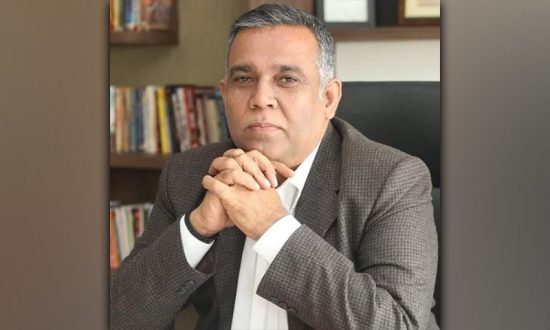A true visionary and philanthropist Mr Rajesh Kumar Singh is constantly worked towards the growth of the community and has dedicated all his earnings in uplifting the educational system of India where education is imparted not only to rich but poor. Rajesh Kumar Singh is the Chairman of Kunwar’s Global School and is a passionate believer and a very hard-working entrepreneur. He has converted his 100-crore land initially allocated for a 5-star club into an educational institute. Crores of investment in its promotion, 50 crores of loan in its construction, Mr Rajesh Kumar Singh donated & sacrificed all for this school. His Intent and strong will of social service did not go unnoticed as he was recognised by many foundations, one of which has awarded him with the Honorary Doctorate for his work in the field of social service.
Challenges of Covid-19 and how the Education Process changed with its factor not only being faced in India, but the entire world is facing an unprecedented difficulty due to the ‘Covid-19’ epidemic.
The lockdown put a grinding halt to all educational institutions, disrupting teaching. In order to ensure the smooth dissemination of knowledge, all educational institutions from schools to universities had to adopt an alternative educational online learning, which is also a term in various other names like digital learning, e-learning, web-based learning, virtual space learning, remote learning, distance-learning or home education. Academic discussions are also happening online along with the meetings for administrative and academic decision making. Therefore this is the way how ‘Corona’ has forced us to work from virtual platforms (which is new to most) in place of traditional real-world platforms (which we are more comfortable with). A large number of teachers and students have shown enthusiasm in adopting new methods of online education, despite many limitations. The students are getting involved in online learning through forms of discussion, homework, providing digital study material and to some extent assessment to render them with a complete package, within the safety of their premises.
With this new experiment, a debate has started about the use and feasibility of online education. The people criticizing the method have a stand that online learning takes place on a virtual learning platform which can never alternate instead of the real learning platform.
- The method is less likely to have mutual human interaction, and therefore it creates a sense of alienation among students. There may be some teachers as well who are also not as comfortable with it.
- It is impossible to evaluate the progress of each student in the virtual world and this leads to the tendency to avoid. Since the program cannot organize a discussion in large groups effectively, it is useful only on small group of students.
- It has serious security concerns and is not effective for practical subjects. The instructor has no means of getting the students to work. The online assessment is also mostly limited to multiple-choice questions. It is also difficult to find out that the registered student has completed the given work/project.
- In offline learning conducted on campuses, the student develops basic human qualities like making friends, being patient, free from disappointment etc. In this, he collectively learns which is quite the contrary in the learning with virtual peers.
- For online classes, the student has to be ever-present in front of a computer, tablet or smart-phones for a long time, due to which he/she may have weak eyesight, stress or other physical problems.
Those who are in favour of online education argue that this allows the student to study independently at their time and place. In this, the student can do his homework quickly and take time to complete his interests and additional skill development courses.
- The medium helps in developing the qualities of responsibility and self-discipline within the student. Students can solve their doubts by sharing it with their peers through discussion board and chats.
- The convenience level of online education is better than ‘face-to-face’ education. This medium is cheaper because it reduces the student’s residential and transportation expenses and also gives them freedom from living in the adverse conditions of the unknown city.
- Furthermore, it can adapt to different needs as it can adapt to suit all learning behaviours and preferences such as visual, audio or dynamics.The reason for this is that various learning methods and tools are available in it. The web-based learning system provides the required environment from which students can progress according to their ability and speed.
Currently, even the best online courses cannot replace the human relationships that develop in students at the time of offline learning and personal relationships with the teacher. With the challenges and gaps associated with digital learning, the launch of a new education policy could serve as the first step for Indian education to transition into the digital sphere. Moving into the digital zone with the gradual change, educational institutions will also get appropriate time to develop the facility and capacity required to provide fully online education and to understand and experience its nuances. Covid -19 has certainly expanded the horizon of education.




